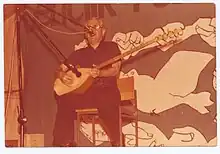Ruhi Su
Mehmet Ruhi Su (1912 – 20 September 1985) was a Turkish opera singer, Turkish folk singer and saz virtuoso of probable Armenian[1][2][3] origin.
Ruhi Su | |
|---|---|
 Ruhi Su at a festival in 1979 | |
| Background information | |
| Birth name | Mehmet Ruhi Su |
| Born | 1912 Van, Ottoman Empire |
| Died | 1985 (aged 72–73) Istanbul, Turkey |
| Genres | Turkish folk music |
| Occupation(s) | Singer-songwriter |
| Instrument(s) | Bağlama |
| Years active | 1942–1985 |
| Labels | İmece Plakları (1971–1985) |
Early life
Mehmet Ruhi Su was born 1912 in Van.[3] He later expressed his situation: "He is one of the children desolated by the World War I." After he lost his family during World War I at a very early age,[3] he was taken from Van to Adana and given to a childless poor family.[4] After living with the family, he was taken to Dârüleytâm, an orphanage that was built in Adana for the Armenian orphans.[5]
He graduated from the Kuleli Military High School in 1931.
Musical background
He started playing violin at the age of ten. In 1936 he graduated from the Teacher's School of Music and in 1942 from the Opera Department of State Conservatory in Ankara. The following ten years, he performed at the State Opera in Ankara as a celebrated bass baritone, appearing in operas such as Madame Butterfly, Fidelio, Tosca and Rigoletto. During his contemporary music education, he also studied Turkish folk music and consequently made regular radio programs, playing saz and singing folk songs, while he worked at the opera.
Political arrest
In 1952 he was arrested, accused of being a member of the banned Turkish Communist Party, and imprisonment for five years, which ended his career in the opera. After serving his sentence for a "thought crime", he dedicated himself to folk music in his unique way.
Folk studies
While he roamed all over Anatolia from one village to another, he started compiling numerous folk songs. Ruhi Su combined his efforts of creating a national awareness of the rich Anatolian culture with his compositions based on texts of Sufi poets Yunus Emre and Pir Sultan Abdal and other Anatolian poets like Köroğlu (see Epic of Köroğlu), Karacaoğlan, and Dadaloğlu.
Death

Ruhi Su died on 20 September 1985 and was buried at the Zincirlikuyu Cemetery in Istanbul. His wife Sıdıka Su died on 18 October 2006. His son Ilgin Ruhi Su lives in Istanbul.[6] In 2009, his gravestone was shot by unknown parties.[7]
Albums
- (1972) Seferberlik Türküleri Ve Kuvayi Milliye Destanı
- (1972) Yunus Emre
- (1972) Karacaoğlan
- (1972) Pir Sultan Abdal
- (1974) Şiirler – Türküler
- (1974) Köroğlu
- (1977) El Kapıları
- (1977) Sabahın Sahibi Var
After his death
- (1986) Pir Sultan'dan Levni'ye
- (1987) Kadıköy Tiyatrosu Konseri I
- (1987) Kadıköy Tiyatrosu Konseri II
- (1988) Beydağı'nın Başı
- (1988) Dadaloğlu Ve Çevresi
- (1989) Huma Kuşu Ve Taşlamalar
- (1990) Sultan Suyu "Pir Sultan Abdal'dan Deyişler"
- (1990) Ruhi Su performs Sufi Hymns by Yunus Emre and Pir Sultan Abdal
- (1991) Dostlar Tiyatrosu Konseri (Sümeyra Çakır İle Birlikte)
- (1992) Ankara'nn Taşına Bak
- (1993) Semahlar
- (1993) Çocuklar, Göçler, Balıklar
- (1993) Zeybekler
- (1993) Ezgili Yürek
- (1993) Ekin İdim Oldum Harman
- (1993) Uyur İken Uyardılar
- (1994) Barabar
- (1995) Aman Of
References
- 100 yaşında bir dev: Ruhi Su. Radikal. 5 September 2012. Retrieved 30 October 2013
- Van Information. Turkey Travel Bazaar. Retrieved 30 October 2013
- Ruhi Su ölümünün 25. yılında anıldı. Etkin Haber Ajansı. 21 September 2010. Retrieved 31 October 2013
- Ruhi Su Anıldı. Bianet. 24 September 2007. Retrieved 31 October 2013
- Ruhi Su. Yüzyıllık öykü Bianet. 19 May 2012. Retrieved 17 January 2020
- Bianet 18 October 2006
- "Ruhi Su'nun anıt mezarına saldırı". Sabah.
Notes
- Ahmet Günlük 1990 HITEK Traditional Turkish Folk Music Through The Centuries – Ruhi Su performs Sufi Hymns by Yunus Emre and Pir Sultan Abdal
External links
- Ruhi Su ile Birlikte Kırk Yıl: Sıdıka Su – web page (in Turkish)